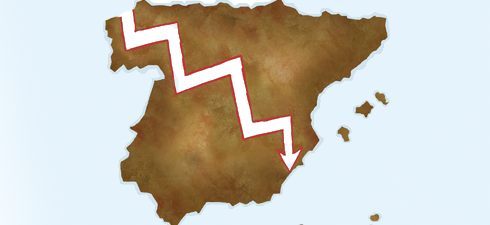One hundred days after the inauguration of his government with its absolute majority, Mariano Rajoy can point to at least three major economic reforms: in labour, in finances, and in budgetary stability. Looking beyond the opinions that might be expressed on each of them (all point in the same direction: to satisfy the obligations imposed by Brussels and to reassure the markets) the PP government cannot be accused of inaction.
The result so far, however, has not been the intended one. The EU is suspicious, and Spain has overtaken Italy at the forefront of problems associated with risk premium, moving into the red zone of eurozone investor concerns. Moreover, in recent days, the Spanish economy has come in for the severest attacks from the main bibles of the global economic press, from various reports by investment banks and, most ironically, from the Italian prime minister himself, Mario Monti, who said "Spain is giving Europe serious concerns".
Monti has probably pointed the finger at Spain to distract the eyes of the markets from Italy’s difficulties and the political fragility of his own reforms. Such policies – of deflecting harm onto one’s neighbour, of every man for himself – abounded in the Great Depression.
Managing distrust
The criticisms converging on Spain’s economic policy are of three kinds: the fear that deficit ceilings will not be met this year (since the delay in approving the budget means that cost-cutting and tax-hikes will have to be concentrated into just eight months); that financial reform is much less "extremely aggressive" [declaration of Minister of Finance, Luis de Guindos] than the labour reform and that it will slow down now that gloom continues to build and credit to retract; and that there is no indication in the government’s actions of any spurs to renewed growth.
The 2012 Budget will be rolled out on Friday against this disturbing backdrop. No one doubts that it will lay out a path for a kind of wartime economy, if the metaphor is permitted. The government will face two conflicting but legitimate claims. Firstly, from citizens, who want the gigantic unemployment market, bigger in Spain than in any other OECD country, to be tackled first, and the safety net to be maintained. Secondly, external demands, whose priority is to draw down the public deficit.
This contradiction, increasingly present, prompts Ivan Krastov, founder of the European Council on Foreign Relations, to define a growing dilemma: "We are witnessing a collapse of confidence in political and business elites (...) Elections are losing their significance as a choice between alternatives and are becoming processions of elites. Thus, democracy is no longer a matter of trust, but rather a matter of managing distrust."
We need a historic compromise
The idea of an exit that will not resemble the exit from the Great Depression is beginning to spread among some analysts. Depending on the impact of new contractionary shocks (oil, raw materials, emerging countries,...) the world may gradually recover from its problems, while the economies of a few countries (including Spain’s) stay trapped in long-term stagnation.
To avoid this would require a consensus on the diagnosis and an agreement among the major political, economic and social forces. Such is the degree of deterioration that not even the power of an absolute majority as large as that of the Spanish government may be enough.
We need a historic compromise between different forces that represent the majority of citizens, without subjecting that compromise to any ideology, and with mutual concessions: working for the welfare of the people with a comprehensive pact that covers the various regions and incorporates stabilisation measures and structural reforms, but policies for growth as well.
Comment
“No other economic policy is possible”
For El Mundo, the general strike of March 29, Spain’s eighth since the return of democracy in 1975, is coming at the “toughest economic time in 30 years, with a government that is trying every day to show its European partners its resolve to honour all its commitments.” The conservative daily denounces the unions, for “protesting against a labour reform after having let unemployment pass the threshold of five million”, and the Socialist opposition, which – although it did not call for the strike – “has shown support."
Spain is at a crossroads. The economy has officially entered a recession; tax revenues continue to fall and the risk premium for debt has reached a level not seen for weeks. In addition, voting back in a socialist government in Andalusia that is in favour of increased public spending will make it even harder for central government to control the deficit. Because Spain is now in the [international] public eye, the unions and political parties should be aware that this strike will punish not the government, but the country. The fact is that no other economic policy is possible. [...] Although most Spaniards support the strike, the government cannot backtrack, because the European Commission is pushing it to take the reforms further, especially the labour market reforms and the cuts to the regional budgets. [...] The latter have become the Achilles heel of Spain’s economy and the government gives no impression of being able to get them under control.
Was this article useful? If so we are delighted!
It is freely available because we believe that the right to free and independent information is essential for democracy. But this right is not guaranteed forever, and independence comes at a cost. We need your support in order to continue publishing independent, multilingual news for all Europeans.
Discover our subscription offers and their exclusive benefits and become a member of our community now!












